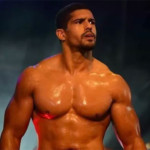
NEW ORLEANS — The New Orleans Pride parade last weekend was marked by rain and uncertainty, as the LGBTQ community rallied in the midst of an increasingly restrictive political climate in Louisiana.
Parade attendees who were interviewed said the restrictive bills brought up in Louisiana Legislature’s 2022 session – and the divisive debate surrounding them – signal a concerning trend from policymakers.
Victoria Trejo and Cole Persick, 21-year-old friends from Franklinton, said they were trying to remain optimistic but are increasingly worried about their future in Louisiana.
“I don’t plan on staying here if I can help it,” Trejo said. “I would move somewhere up north where it’s more LGBTQ friendly. I would hate to miss all of this because there’s so much culture here, but it doesn’t feel safe.”
Persick said he was glad to see the community come together, especially because Franklinton does not have a large LGBTQ presence. While he feels that conservative voices in the Legislature do not speak for people, he is still disheartened by recent proposals.
“They’re constantly making things against us. That really sucks,” Persick said.
The Fairness in Womens Sports Act, which goes into effect in August, prohibits transgender athletes from participation in sports. Louisiana public schools and colleges, along with some private schools that receive state funding, will use biological sex to determine eligibility. Only those assigned female at birth can participate on women’s and girls’ athletic teams.
Gov. John Bel Edwards vetoed the 2021 version of the bill, authored by Sen. Beth Mizell, R-Franklinton, but he declined to do so this year. The governor said while he still opposes the legislation, Republican lawmakers had the votes to override his veto – unlike last year.
An attempt to align Louisiana law with a federal statute that protects the LGBTQ community against housing discrimination was voted down in the House of Representatives without discussion. This was the second year in a row Rep. Aimee Freeman, D-New Orleans, had attempted to pass the bill.
Not all of the proposals negatively targeting the LGBTQ community were successful in the Legislature.
House Bill 570, authored by Rep. Gabe Firment, R-Pollock, would have prohibited gender-affirming procedures for anyone younger than 18, even with the consent of their parents. The ban, which would have included drugs and surgeries, was never brought up for a vote in the House Health and Welfare Committee.
A bill from Rep. Dodie Horton, R-Haughton, sought to prohibit K-12 classroom discussion of sexual orientation and gender identity. It failed in the House Education Committee but was revived in a rare procedural move.
Rep. Raymond Crews, R-Bossier City, got the so-called “Don’t Say Gay” legislation discharged from the committee and placed on the calendar of the Committee of the Whole. It would have effectively turned the entire House into a panel to rehear testimony for and against the bill, but Horton voluntarily shelved the legislation because she said she did not want to put her colleagues through a drawn-out deliberation.
Even though these bills failed, the fact they are brought up in the first place takes a toll, many parade-goers said. At the Pride parade, New Orleans native Emosha Antoine said the proposed restrictions can pit allies against one another.
“Women’s rights and LGBTQ rights intersect. The way that they’re trying to make it a separate issue, you don’t have to pick one. It’s like they forget we are human. I shouldn’t have to pick which rights I want (or) what is more important,” Antoine said. “It’s almost as if they want marginalized groups to kind of lessen their life because it makes it easier for us to be pushed on the back burner.”
The continued emphasis on anti-LGBTQ legislation also has the potential to hurt tourism, a significant tax revenue generator for Louisiana, said Dr. Bridget Bordelon, a hospitality management professor at the University of New Orleans.
“New Orleans is known as a very LGBTQ-friendly community. If we have that kind of destination image as being inclusive and not discriminating, people feel safe here coming to New Orleans,” Bordelon said. “If we’re proposing legislation that makes it appear as though we are not comfortable discussing sexual orientation our schools and academically, trying to pass legislation, we might offend visitors, and that could have an impact.”
Bordelon cited the millions North Carolina lost after its controversial “bathroom bill” rolled back protections against LGBTQ discrimination. The NBA had scheduled its 2017 All-Star Game in Charlotte, but it moved the multi-day event to New Orleans after the law was approved.
Despite the general disillusionment with government, a common sentiment at the Pride parade was resilience. Participants still danced down the street in rhinestones and rainbows, one person holding up a sign that read “Hate Will Not Win.”
Matt Flagg, who marched in the parade with his vividly colored alien group, the Intergalactic Realtors Association, said he was focused on the present.
“This week, it’s just me and our best friends in the world, who are all weirdos being aliens,” Flagg said. “I decided to let that all go and not think about it right now because this is our time.”
SUPPORT NEWS YOU TRUST.








